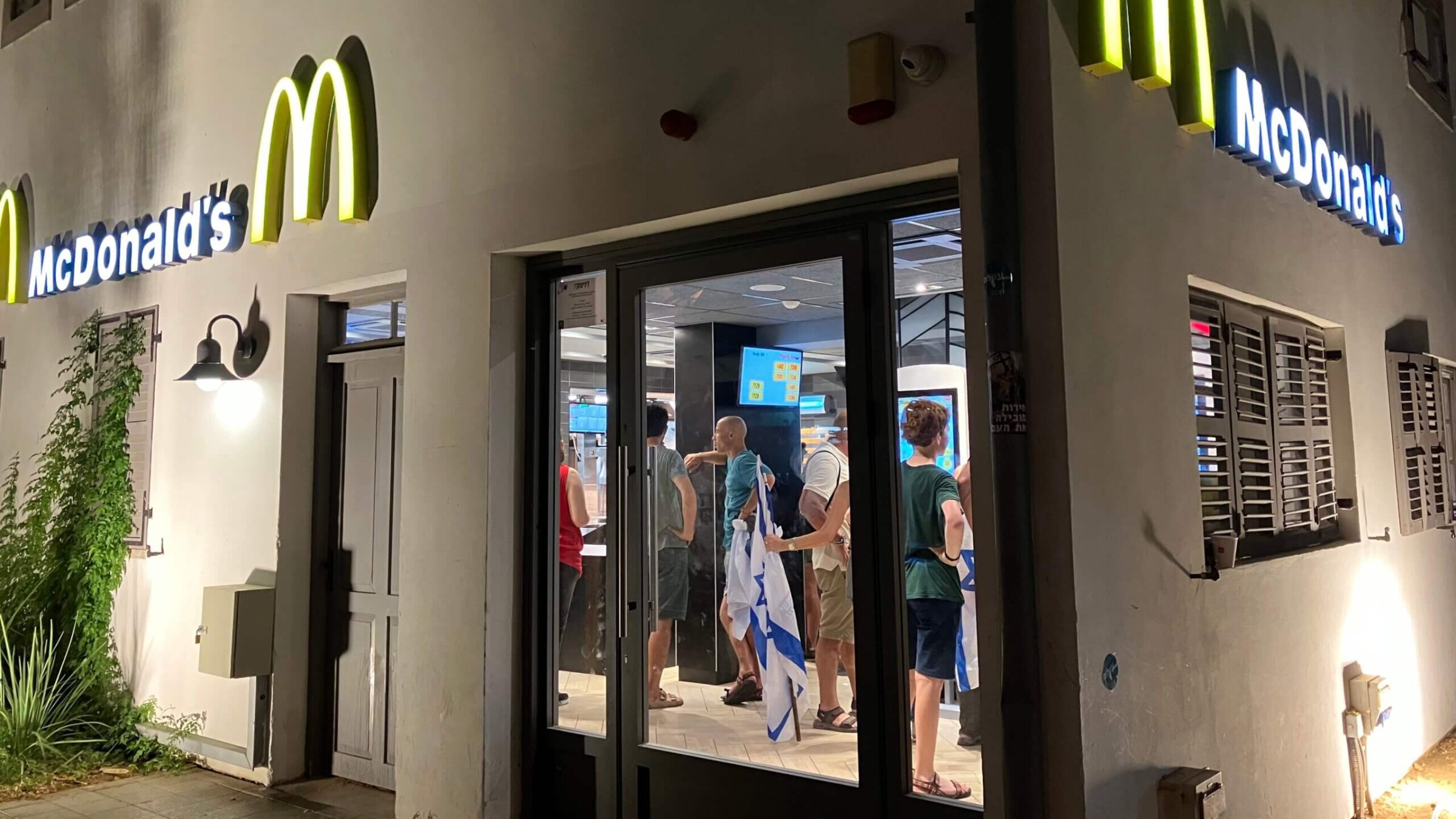Israel’s protest movement has birthed a cottage industry
Vendors populate Tel Aviv’s protests, hawking cold water and noisemakers

A McDonalds on the protest route in Tel Aviv filled with protestors after the march dispersed. Photo by Mira Fox
TEL AVIV — Even during August, when much of Israel is on vacation, Tel Aviv’s Saturday night protests are mind-bogglingly huge. This past Saturday, there was such a large tide of Israeli-flag carrying protesters that I didn’t have to use Google to guide me; I could just let myself be swept along on a 30-minute walk to the newly christened Democracy Square.

Streets were closed, blocked by large trucks, and they were filled with vendors. The protests are composed of many groups of Israeli society — tech workers; a group of veterans who call themselves the Brothers in Arms; the Kaplan Force, which leads Tel Aviv’s protests; anti-occupation protesters; women’s rights activists; a pride group carrying rainbow versions of Israel’s flag — and each one had a table selling T-shirts and stickers, and QR codes taped to tables for people to pay or simply make a donation.
The demonstrations have become expensive. The Kaplan Street protest, Tel Aviv’s weekly Saturday demonstration, has been meeting weekly for well over six months, and has built up a lot of infrastructure to handle the crowds.
About a kilometer away from the protest’s main square, large screens and loudspeakers have been set up, one per block, to ensure that everyone can see and hear the speeches. (With hundreds of thousands of attendees, not everyone fits into the main square where the stage is.)
It’s not unlike the big screens at a sports game; people crowd in to get good spots, some even set up camping chairs with a good view before the speeches begin. The screens play music and videos of the week’s demonstrations elsewhere, hyping up the crowd. And during the main event, they prompt everyone with chants, flashing “De-mo-crat-ia” in rhythm. There’s also a sign language interpreter.
They even flash the chants so the crowd knows when it's time to make! some! noise!!!!
— Mira Fox (@miraefox) August 16, 2023
The protests are so big that thousands can't get into the main square, and the screens ensure everyone can hear and see what's going on. There's even a sign language interpreter! pic.twitter.com/278XtHCmPZ
The tables help to fund the demonstrations; protesters told me they had heard that tens of millions of shekels had been donated, both through the tables and through WhatsApp groups that organize the demonstrations; each message includes a donation link. These funds paid for the screens, the loudspeakers and even the work of some of the organizers.

But not everyone was selling goods to fund the protests; some seemed to be simply taking advantage of the moment.
Eager vendors somehow managed to pilot shopping carts through the packed crowd, hawking cold water, lemonade, popsicles and soft pretzels. Others filled their carts with flags, noisemakers and lights to ensure every protester had whatever they needed.
“The money is solid,” one man shouted over the roar of the crowd. He had a glass jar of lemonade perched on a box next to his metal shopping cart that was filled with water and coolers of popsicles. He said he’d made over a thousand shekels that evening, nearly $300 — impressive given that the water was only going for 5 shekels (roughly $1.30) per bottle.
The brick-and-mortar businesses on and around Kaplan Street benefit too; as the protest dispersed, the McDonald’s nearby filled with protesters, still wearing flags tied around their necks, waiting in line to order a burger.





















